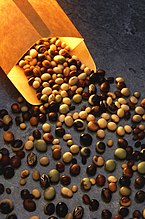surely, burning vegetable oil in place of diesel is dirt to the environment?
People keep suggesting filling my car up with vegetable oil, I can't help but wonder how devastating it would be to the environment to burn vegetable oil from my car exhaust?
People keep suggesting filling my car up with vegetable oil, I can't help but wonder how devastating it would be to the environment to burn vegetable oil from my car exhaust?
you can use a 50:50 mixture (veg oil /diesel) cleans the engine out in the process and is better than diese for the environment as its carbon neutral its the functional ingredient in biodiesel
My car is actually oldish anyway. Its a late 2003 model, 4 days away from being a 2004 car.
Would it take kindly to drinking vegetable oil?
Would it take kindly to drinking vegetable oil?
There's a reasonable chance you've got a common rail engine then, in which case stick to the mineral diesel.
What car is it? If it is common rail, don't.
Would it take kindly to drinking vegetable oil?
Probably too new.
Would it take kindly to drinking vegetable oil?
2003 is new! We're talking about 90's and older here.
could work...my dad's estate was a 2001 that lasted 11 years until he crashed it
... but not the CO2 of the diesel burned growing it, which is often close to a litre for every useable litre of bio-diesel.
Vegetable oil is carbon offset.
Vegetable oil is not bio-diesel (unless it is made in to bio-diesel) and some energy (not always diesel) is used to do that.
WIKIPASTA!!!!!!!!!!
[h="3"]Biodiesel feedstocks[edit][/h]
| Plant oils |
|---|
 Soybeans are used as a source of biodiesel |
| Types |
| Uses |
| Components |
A variety of oils can be used to produce biodiesel. These include:
•
Virgin oil feedstock – rapeseed and soybean oils are most commonly used, soybean oil accounting for about half of U.S. production.[75] It also can be obtained from Pongamia, field pennycress and jatropha and other crops such as mustard, jojoba, flax, sunflower, palm oil, coconut and hemp (see list of vegetable oils for biofuel for more information);
•
Waste vegetable oil (WVO);
•
Animal fats including tallow, lard, yellow grease, chicken fat,[76] and the by-products of the production of Omega-3 fatty acids from fish oil.
•
Algae, which can be grown using waste materials such as sewage[77] and without displacing land currently used for food production.
•
Oil from halophytes such as Salicornia bigelovii, which can be grown using saltwater in coastal areas where conventional crops cannot be grown, with yields equal to the yields of soybeans and other oilseeds grown using freshwater irrigation[78]
•
Sewage Sludge - The sewage-to-biofuel field is attracting interest from major companies like Waste Management and startups like InfoSpi, which are betting that renewable sewage biodiesel can become competitive with petroleum diesel on price.[79]
Vegetable oil is not bio-diesel (unless it is made in to bio-diesel) and some energy (not always diesel) is used to do that.
That's splitting hairs a little isn't it? In any case it's only carbon neutral (carbon offset is when you e.g. plant trees or reduce emissions elsewhere to compensate for emissions that are made) if you ignore the energy used in growing it in the first place. I did some cultivations for rapeseed a few years back and was going through nearly 500 litres of mineral diesel a day. As I said previously, to grow enough feedstock to produce a certain amount of biodiesel nearly the same quantity of diesel had to be burned in the first place. Yes, if you don't convert it to biodiesel the numbers will be a little better, but there's still a huge energy expenditure to get vegetable oil in the first place.
I don't think so, you tried to correct what was a perfectly correct statement. So read to make sure I was right and thought I would let you know.
It does seem a bit unlikely to me though that this could be true; you were saying almost 1 litre of diesel is used to produce every litre of bio-diesel? Are you a farmer or was this a project you worked on? Out of interest could you quote a source
It does seem a bit unlikely to me though that this could be true; you were saying almost 1 litre of diesel is used to produce every litre of bio-diesel? Are you a farmer or was this a project you worked on? Out of interest could you quote a source
It's not a correct statement though. When you burn vegetable oil (or biodiesel, it doesn't matter) the carbon released is only that which was captured when it was grown. So far so good. However, you haven't taken into account the amount of carbon burned to grow (and process) it in the first place, which is additional to the carbon released when the vegetable oil was burned. Therefore the net effect is more carbon emitted than captured.
That's what I was told. I was working on a farm at the time and that's what one of the permanent farm hands told me, and he'd been quite closely involved I think. The rape hadn't been grown with the intention of using it for biodiesel but there had been a glut and it was the best way they could get rid of it. Biodiesel is a good way of using surplus crops which would potentially would otherwise be wasted, but you can't grow a crop and turn it into biofuel and claim it's carbon neutral. The only way that claim would be valid is if the energy used (diesel burned) in growing it was carbon neutral. You could argue that if you grew a crop for biodiesel and then used that to grow the next crop and so on you could produce carbon neutral fuel (other than the initial carbon investment for the first crop) but realistically the net amount of fuel produced wouldn't be sufficient to make it worthwhile.
That's what I was told. I was working on a farm at the time and that's what one of the permanent farm hands told me, and he'd been quite closely involved I think. The rape hadn't been grown with the intention of using it for biodiesel but there had been a glut and it was the best way they could get rid of it. Biodiesel is a good way of using surplus crops which would potentially would otherwise be wasted, but you can't grow a crop and turn it into biofuel and claim it's carbon neutral. The only way that claim would be valid is if the energy used (diesel burned) in growing it was carbon neutral. You could argue that if you grew a crop for biodiesel and then used that to grow the next crop and so on you could produce carbon neutral fuel (other than the initial carbon investment for the first crop) but realistically the net amount of fuel produced wouldn't be sufficient to make it worthwhile.
It does seem a bit unlikely to me though that this could be true; you were saying almost 1 litre of diesel is used to produce every litre of bio-diesel? Are you a farmer or was this a project you worked on? Out of interest could you quote a source
Oh for **** sake!
I was only asking a question. You don't need to argue with each other and make me feel like an argument starter, grow up the pair of you !
Quick Reply
Related discussions
- how to go vegan
- does anyone have a good mneumonic to remember this?
- Biology a level question - Ecology
- Quick and Easy Student Friendly Meals
- how to lose weight healthily???
- Skincare help
- Acne /skin texture on the face
- BP IST
- How to lose weight?
- Do macros matter on a cut?
- Can i skip cleanser and just use water towash my face
- Smoking pizza stone
- Used car recommendations?
- My dad doesn’t wash his hands after pouring bleach
- What cooking disasters have you had?
- Farmers protests across Europe: are the farmers right?
- How to introduce new foods to diet?
- My face burns and itches from anything
- Do we actually need bees?
- My Favourite Places in Kingston Uni
Latest
Last reply 1 minute ago
JK Rowling in ‘arrest me’ challenge over hate crime lawLast reply 1 minute ago
Official: University of Birmingham A100 2024 Entry Applicants1038
Last reply 6 minutes ago
Official London School of Economics and Political Science 2024 Applicant ThreadLast reply 8 minutes ago
Official: University of Manchester A106 2024 Entry Applicants1291
Last reply 8 minutes ago
Rishi Sunak pledges to remove benefits for people not taking jobs after 12 monthsLast reply 16 minutes ago
year 13 gyg journal : trying not to become an academic victim 🤡📖Last reply 17 minutes ago
NICS Staff Officer and Deputy Principal recruitment 2022 2023Last reply 20 minutes ago
Official: University of Bristol A100 2024 Entry ApplicantsTrending
Last reply 5 months ago
Where is my car parked during the day? Advice for first car insuranceTrending
Last reply 5 months ago
Where is my car parked during the day? Advice for first car insurance


